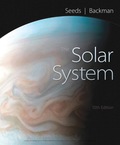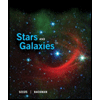
The Solar System
10th Edition
ISBN: 9781337672252
Author: The Solar System
Publisher: Cengage
expand_more
expand_more
format_list_bulleted
Concept explainers
Question
Chapter 3, Problem 2RQ
To determine
Describe how the Greek designation of a star tells about its location and apparent brightness.
Expert Solution & Answer
Want to see the full answer?
Check out a sample textbook solution
Students have asked these similar questions
got 4.67 for 1 then 9.33 for the rest then 21.33 for the input and output but it says all are wrong
mase
as shown
2) A holy of once sty extually at rest & acted upon by
bus mutually perpendicular forces 12 Nand 5N
belowilf the particle moves in derection Calculato
the magnitude of the
acceleration
of
12nt
R
0
so
A
SN
Required information
Two speakers vibrate in phase with each other at 523 Hz. At certain points in the room, the sound waves from the two
speakers interfere destructively. One such point is 1.45 m from speaker #1 and is between 2.00 m and 4.00 m from
speaker #2. The speed of sound in air is 343 m/s.
How far is this point from speaker #2?
m
Chapter 3 Solutions
The Solar System
Ch. 3 - Why are most of the constellations that were...Ch. 3 - Prob. 2RQCh. 3 - Prob. 3RQCh. 3 - Prob. 4RQCh. 3 - Prob. 5RQCh. 3 - Prob. 6RQCh. 3 - Prob. 7RQCh. 3 - Prob. 8RQCh. 3 - Prob. 9RQCh. 3 - Prob. 10RQ
Ch. 3 - Prob. 11RQCh. 3 - If Earth had no atmosphere, what color would the...Ch. 3 - If the Moon orbited Earth from North Pole to South...Ch. 3 - Why do solar eclipses happen only at new moon? Why...Ch. 3 - Prob. 15RQCh. 3 - Prob. 16RQCh. 3 - Prob. 17RQCh. 3 - Why cant the Moon be eclipsed when it is halfway...Ch. 3 - Prob. 19RQCh. 3 - Prob. 20RQCh. 3 - Prob. 21RQCh. 3 - Prob. 22RQCh. 3 - Pretend the Moon’s orbit around Earth is a perfect...Ch. 3 - Prob. 2PCh. 3 - Identify the phases of the Moon if at sunset in...Ch. 3 - What fraction of the Moons surface area is the far...Ch. 3 - Prob. 5PCh. 3 - Prob. 6PCh. 3 - Prob. 7PCh. 3 - Prob. 8PCh. 3 - Prob. 9PCh. 3 - Prob. 10PCh. 3 - Prob. 11PCh. 3 - Prob. 12PCh. 3 - Prob. 13PCh. 3 - If a solar eclipse occurs on October 3: (a) Why...Ch. 3 - Prob. 15PCh. 3 - Prob. 16PCh. 3 - Prob. 17PCh. 3 - Prob. 18PCh. 3 - Prob. 1SPCh. 3 - Prob. 2SPCh. 3 - Prob. 1LLCh. 3 - Prob. 2LLCh. 3 - Prob. 3LLCh. 3 - Prob. 4LLCh. 3 - Prob. 5LLCh. 3 - Prob. 6LLCh. 3 - Prob. 7LLCh. 3 - Prob. 8LLCh. 3 - Prob. 9LLCh. 3 - Prob. 10LLCh. 3 - Prob. 11LL
Knowledge Booster
Learn more about
Need a deep-dive on the concept behind this application? Look no further. Learn more about this topic, physics and related others by exploring similar questions and additional content below.Similar questions
- a) Consider the following function, where A is a constant. y(x,t) = A(x — vt). Can this represent a wave that travels along? Explain. b) Which of the following are possible traveling waves, provide your reasoning and give the velocity of the wave if it can be a traveling wave. e-(a²x²+b²²-2abtx b.1) y(x,t) b.2) y(x,t) = = A sin(ax² - bt²). 2 b.3) y(x,t) = A sin 2π (+) b.4) y(x,t) = A cos² 2π(t-x). b.5) y(x,t) = A cos wt sin(kx - wt)arrow_forwardThe capacitor in (Figure 1) is initially uncharged. The switch is closed at t=0. Immediately after the switch is closed, what is the current through the resistor R1, R2, and R3? What is the final charge on the capacitor? Please explain all steps.arrow_forwardSuppose you have a lens system that is to be used primarily for 620-nm light. What is the second thinnest coating of fluorite (calcium fluoride) that would be non-reflective for this wavelength? × nm 434arrow_forward
- The angle between the axes of two polarizing filters is 19.0°. By how much does the second filter reduce the intensity of the light coming through the first? I = 0.106 40 xarrow_forwardAn oil slick on water is 82.3 nm thick and illuminated by white light incident perpendicular to its surface. What color does the oil appear (what is the most constructively reflected wavelength, in nanometers), given its index of refraction is 1.43? (Assume the index of refraction of water is 1.33.) wavelength color 675 × nm red (1 660 nm)arrow_forwardA 1.50 μF capacitor is charging through a 16.0 Ω resistor using a 15.0 V battery. What will be the current when the capacitor has acquired 1/4 of its maximum charge? Please explain all stepsarrow_forward
- In the circuit shown in the figure (Figure 1), the 6.0 Ω resistor is consuming energy at a rate of 24 J/s when the current through it flows as shown. What are the polarity and emf of the battery E, assuming it has negligible internal resistance? Please explain all steps. I know you need to use the loop rule, but I keep getting the answer wrong.arrow_forwardIf you connect a 1.8 F and a 2.6 F capacitor in series, what will be the equivalent capacitance?arrow_forwardSuppose that a particular heart defibrillator uses a 1.5 x 10-5 Farad capacitor. If it is charged up to a voltage of 7300 volts, how much energy is stored in the capacitor? Give your answer as the number of Joules.arrow_forward
- The voltage difference across an 8.3 nanometer thick cell membrane is 6.5 x 10-5volts. What is the magnitude of the electric field inside this cell membrane? (Assume the field is uniform, and give your answer as the number of Volts per meter... which is the same as the number of Newtons per Coulomb.)arrow_forwardThree identical capacitors are connected in parallel. When this parallel assembly of capacitors is connected to a 12 volt battery, a total of 3.1 x 10-5 coulombs flows through the battery. What is the capacitance of one individual capacitor? (Give your answer as the number of Farads.)arrow_forwardSuppose you construct your own capacitor by placing two parallel plates at a distance 0.27 meters apart. The plates each have a surface area of 0.64 square meters. What is the capacitance of this setup? (Give your answer as the number of Farads.)arrow_forward
arrow_back_ios
SEE MORE QUESTIONS
arrow_forward_ios
Recommended textbooks for you
 Foundations of Astronomy (MindTap Course List)PhysicsISBN:9781337399920Author:Michael A. Seeds, Dana BackmanPublisher:Cengage Learning
Foundations of Astronomy (MindTap Course List)PhysicsISBN:9781337399920Author:Michael A. Seeds, Dana BackmanPublisher:Cengage Learning Stars and Galaxies (MindTap Course List)PhysicsISBN:9781337399944Author:Michael A. SeedsPublisher:Cengage Learning
Stars and Galaxies (MindTap Course List)PhysicsISBN:9781337399944Author:Michael A. SeedsPublisher:Cengage Learning

 AstronomyPhysicsISBN:9781938168284Author:Andrew Fraknoi; David Morrison; Sidney C. WolffPublisher:OpenStax
AstronomyPhysicsISBN:9781938168284Author:Andrew Fraknoi; David Morrison; Sidney C. WolffPublisher:OpenStax Stars and GalaxiesPhysicsISBN:9781305120785Author:Michael A. Seeds, Dana BackmanPublisher:Cengage Learning
Stars and GalaxiesPhysicsISBN:9781305120785Author:Michael A. Seeds, Dana BackmanPublisher:Cengage Learning

Foundations of Astronomy (MindTap Course List)
Physics
ISBN:9781337399920
Author:Michael A. Seeds, Dana Backman
Publisher:Cengage Learning

Stars and Galaxies (MindTap Course List)
Physics
ISBN:9781337399944
Author:Michael A. Seeds
Publisher:Cengage Learning



Astronomy
Physics
ISBN:9781938168284
Author:Andrew Fraknoi; David Morrison; Sidney C. Wolff
Publisher:OpenStax

Stars and Galaxies
Physics
ISBN:9781305120785
Author:Michael A. Seeds, Dana Backman
Publisher:Cengage Learning